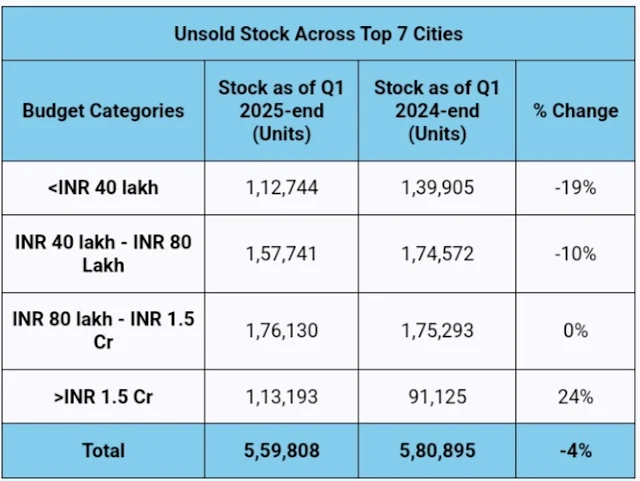India’s affordable housing segment witnessed a notable improvement in Q1 2025, with unsold inventory shrinking by 19% across the top 7 cities—from approximately 1.40 lakh units in Q1 2024 to 1.13 lakh units by Q1 2025-end, according to latest research by ANAROCK.
This sharp reduction is attributed to restricted new supply in the affordable segment (units priced below INR 40 lakh) over the past year, as developers shifted focus to mid-range and premium categories post-pandemic.
In contrast, unsold luxury housing stock (priced above INR 1.5 Cr) surged by 24%, rising from approx. 91,125 units in Q1 2024 to over 1.13 lakh units in Q1 2025, largely due to robust supply and investor caution amid global economic uncertainties.
Bengaluru led the affordable recovery with a massive 51% drop in unsold stock. Chennai followed with a 44% decline, while Hyderabad was the outlier, witnessing a 9% increase in its unsold affordable stock to 1,815 units. On the luxury front, Chennai (-4%) and Pune (-11%) were the only cities to register a decline in unsold inventory, while the remaining five cities saw an increase.
Anuj Puri, Chairman – ANAROCK Group, commented, “Affordable housing bore the brunt of the pandemic, with its share in total housing sales dropping from 38% in 2019 to 18% in 2024, and supply share falling from 40% to 16% in the same period. However, the 19% dip in unsold stock now points to steady end-user demand.”
He added, “Luxury housing has performed exceptionally in recent years, with its sales share rising from 7% in 2019 to 26% in 2024. But the recent inventory build-up reflects rising supply and investor wariness.”
Mid-segment housing (INR 40–80 lakh) saw a 10% annual decline in unsold stock, from 1.75 lakh to 1.58 lakh units. Premium housing (INR 80 lakh–1.5 Cr) maintained status quo, with no significant change in inventory. Overall, unsold housing stock across all segments fell 4% year-on-year, from 5.81 lakh units to 5.60 lakh units.
As of Q1 2025-end, a total of 5.59 lakh units remain unsold across the top 7 cities. Of these, both the affordable (1.12 lakh units) and luxury (1.13 lakh units) segments individually contribute to nearly 20% of the total unsold inventory.
City-wise, MMR saw an 11% decline in affordable housing stock and a 6% increase in luxury stock. NCR witnessed a 22% drop in affordable stock and a sharp 78% jump in luxury units. Bengaluru’s affordable stock dropped 51%, while its luxury inventory rose by 57%. Chennai saw a 44% dip in affordable stock and a 4% drop in luxury. Pune recorded a 28% drop in affordable inventory and 11% decline in luxury stock. Kolkata’s affordable segment fell by 20%, but its luxury stock nearly doubled (up 96%). Hyderabad saw a 9% increase in affordable stock and a 6% rise in luxury inventory.




Comments